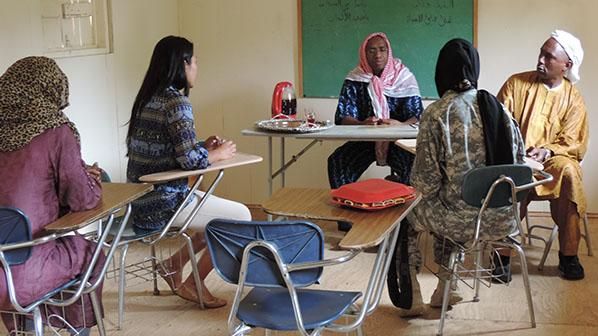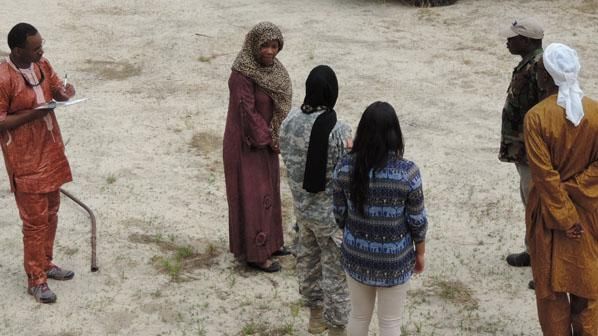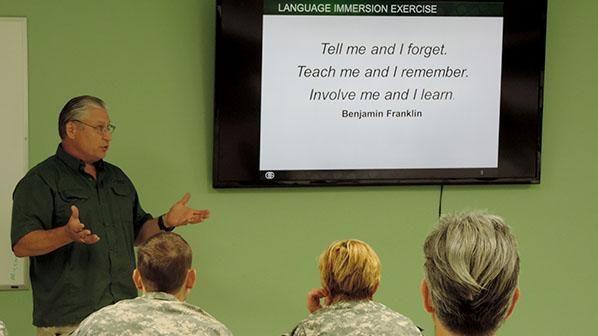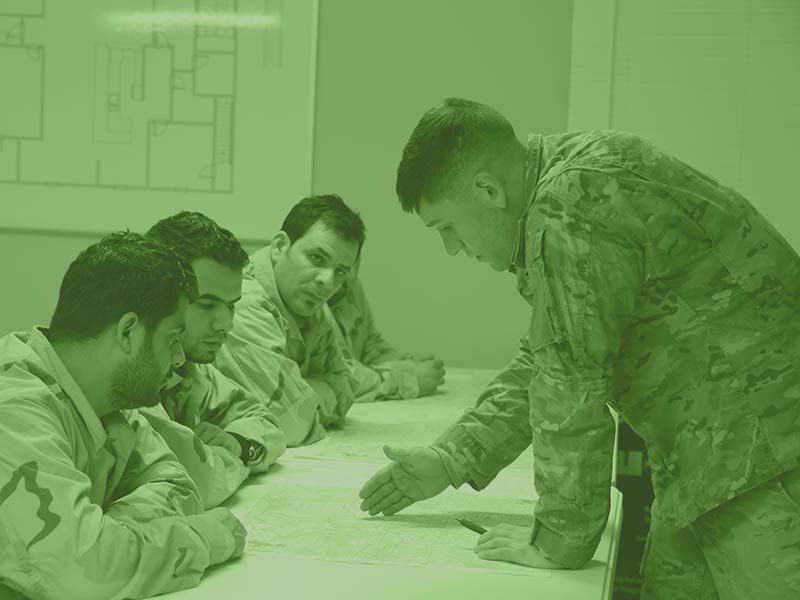Language Immersion Exercise
The language immersion exercise is an approach to foreign language instruction in which the usual curricular activities are conducted totally in a foreign language while immersed in a culturally realistic setting. Immersion represents the most intensive form of content-based foreign language instruction that we can provide. Oak Grove conducted a language based, cultural immersion exercise at the Oak Grove Training Center in Hoffman, NC. The Special Operations Forces (SOF) language students (ten total both French and Russian) received language/cultural instruction and an in-depth immersion exercise with language qualified Subject Matter Experts (SMEs).
SMEs test the Soldiers language skills and cultural awareness couched in mission related tactics techniques and procedures. The goal of our immersion exercises is to create culturally realistic tactical situations requiring the students to use critical thinking skills to accomplish a military goal. The language students were trained at the Tactical Training Site for half of the day in the classroom and then moved to the Cultural Training Site to work through the language/cultural situations in the appropriate cultural-specific villages. Russian students entered a Ukrainian village to determine who was in support of the established government and who had ties with Russia. The French students entered a Western African village to discuss helping them with their border security and refugee problems from a neighboring country. The scenarios required the students to discover, adapt, and retain the language and culture skills necessary to accomplish their mission.
CHALLENGES:
Each Oak Grove Immersion Exercise utilizes a camera crew to film specific encounters between the students and the language qualified SMEs for post-scenario instructor critique. These brief After Action Reviews (AARs) are given to the students by their language instructors or cultural mentors thus highlighting what the student did correctly, what requires improvement, as well as suggestions for future improvement. These AARs also allow the student to conduct a self-critique along with peer evaluation in order to receive all-around input for improvement. During this exercise there occurred some “technical” difficulty. This was primarily caused by a drenching thunder storm which hindered both video and audio recording. Little of the video was useful and all of the audio failed due to the noise and intensity of the storm.
SOLUTION:
To supplement for the lack of video feedback, the cultural mentor for each team provided a written review of each student’s performance with additional comments taken from the SME role players. Additionally, Oak Grove requested that the students provide us with a written review of the exercise from their perspective. This was used to replace the lack of quality video footage and provide both the student and their command constructive criticism on student performance in the areas of language ability, cultural awareness, and use of critical thinking skills to conduct crisis mitigation in a realistic military situation.
CLIENT:
U.S. Army Special Operations Command
MARKET:
Department of Defense
NATURE OF WORK:
Cross-Cultural Communications Training
RESULTS:
Scenarios induced Soldiers to communicate while using critical thinking skills to conduct crisis resolution. The principal duty of the OGT role player was to speak with the Soldiers in their native language, and through their language and behavior, give the Soldiers subjects for conversation along with an interesting problem to solve. These conversations needed to be authentic, real, and natural in order to create a genuine desire on the part of the Soldiers to speak with them. At the end of the immersion exercises, students were fully aware of the cultural indoctrination, and appropriate actions to ensure the host nation was not offended while still accomplishing their mission.
OGT received overwhelmingly positive feedback from the students, visitors, and academic observers. Specifically, these outside academics, from various instructional backgrounds, were impressed with the realism of the scenarios and the detail provided by the Language Instructors, Cultural Mentors and Role Players. The Oak Grove Training Center also received high marks for the elaborate decorations and realistic props.
While use of video and audio footage is extremely useful, evaluations provided by the language instructors, cultural mentors, and role players themselves provided Soldiers and their command adequate training assessment.




